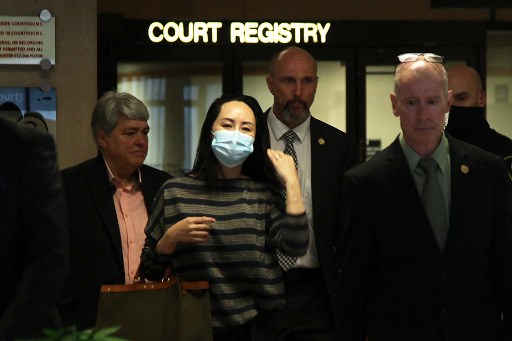by David BALL
A Canadian border officer admitted at Huawei executive Meng Wanzhou’s extradition hearing Wednesday he lost possession of passcodes to her electronic devices, handing them to federal police.
Scott Kirkland, with the Canada Border Services Agency, said it is common for travelers to be asked to hand over passwords and access codes during an inspection, as Meng was on December 1, 2018 during a Canadian stopover from Hong Kong.
He said he usually writes the passcodes on a sticky note or piece of paper that is returned to them afterwards.
But after handing Meng over to the Royal Canadian Mounted Police (RCMP), when he could not find the piece of paper with her passcodes, he realized he’d given them to the RCMP.
“I didn’t know,” he said, “if that piece of paper went with (the RCMP), or with the folder we created, or was still on the counter. I looked on the counter and the folder, but couldn’t find it.”
Handing the passcodes to the RCMP is a violation of Canada’s privacy laws. “That information is not allowed to be passed off,” Kirkland said.
Earlier, defense lawyer Richard Peck accused a Canadian policeman of giving “not an honest” reply on whether Meng should be extradited to the US.
The accusation targeted RCMP Constable Winston Yep’s testimony about why he delayed arresting Meng on a US warrant during her stopover in Vancouver.
Meng is wanted by the United States on fraud charges related to violations of American sanctions in Iran.
Yep testified that he did not immediately arrest Meng when her flight landed because of “safety reasons,” telling the court she might have had a knife, secret bodyguards or even “counter-surveillance” agents with her.
He also said border officials wanted to question her first about her immigration status.
But Peck replied, “My view is that’s not an honest answer. Safety was never an issue; that’s my suggestion to you.”
Meng was interrogated by the CBSA for nearly three hours without legal representation, before being arrested by the RCMP.
The defense contends that Canadian authorities conspired with the US to delay Meng’s arrest and obtain information that could be used at trial, in violation of her rights — which Canada rejects.
“Initially, RCMP thought (they) would stand by gate to arrest (Meng),” Peck said, quoting from RCMP notes on her detention. “And had that happened, she would have been arrested at the gate… and given her Charter rights.”
Meng’s arrest plunged Canada-China relations into crisis, leading days later to the detention on espionage suspicions of two Canadians, Michael Kovrig and Michael Spavor, which Ottawa says was retaliatory.
The extradition case is scheduled to wrap up in April 2021.
str/amc/to
© Agence France-Presse
/AFP

